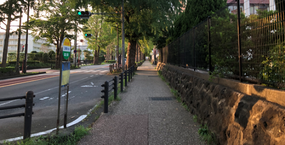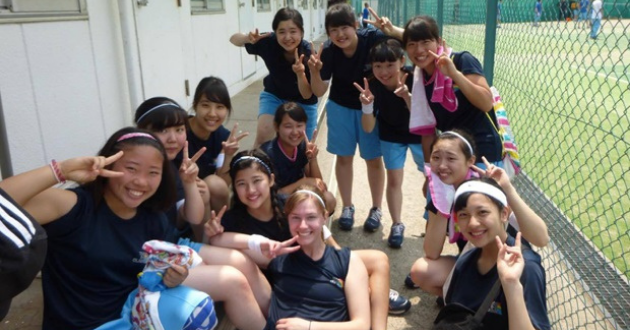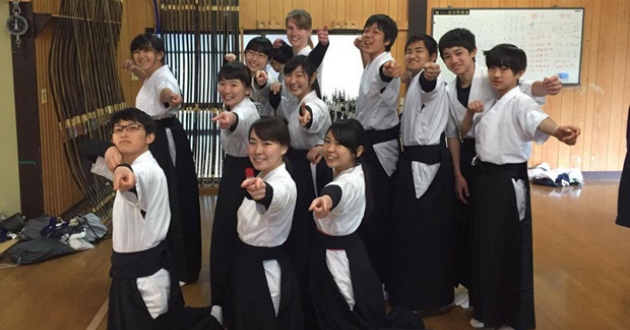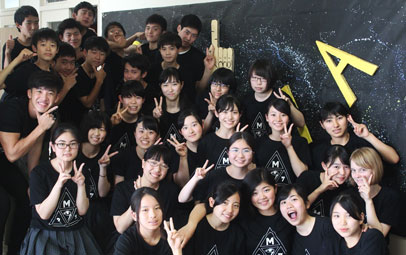Student Exchange Programs in Japan
GAIN UNIQUE INSIGHT INTO JAPANESE CULTURE
Your student exchange program to Japan will step you into a land of exquisite beauty and tradition
Konnichiwa! Think differently and become an exchange student in Japan. Learn Japanese, gain an insight into an exciting culture, and experience a high school life beyond the ordinary.
By studying at high school in Japan and sharing your spare time with a caring Japanese host family and friends, you will learn far more about Japanese society than you can as a tourist. The country’s caring and friendly inhabitants are happy welcome and introduce you to everyday life.
Welcome to Japan!
Quick facts
Age of students: 15–17 years
Departure: April or August/September, November, December
Language requirements: intermediate Japanese reading & listening (level N4 JLPT required)
Visa: Subject to program length
Area request: No
Soft Landing Camp: No
School day: Normally from 8.30 to 15.30
Subjects: There are both compulsory subjects and electives
Program: Classic High School
Views from Japan
Our high school programs
In Japan, we offer our Classic High School exchange program.
About high school in Japan
As an exchange student in Japan, you will explore the teenage life in an entirely different culture. Experiencing the daily life of your Japanese peers is invaluable. School uniforms, discipline, and the hiragana alphabet await in the Japanese high schools.
You can count on lots of attention and questions from curious classmates, particularly on those first days at school. Practice your Japanese skills in advance so that you can ask questions and answer your classmates smoothly.
Enquire now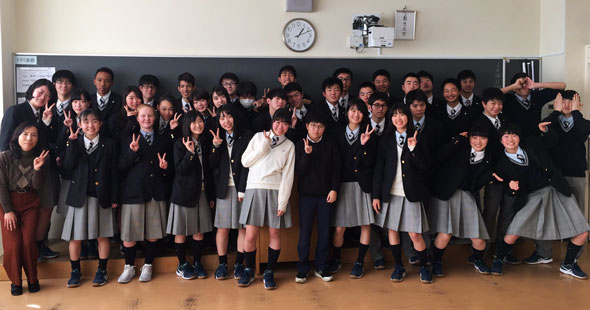
Subjects and school activities
The classes in the Japanese high schools are often quite large, around 30-40 pupils per class. You will be placed in the class that suits your age and language ability best, and allocated a timetable. Local students usually take subjects such as mathematics, social studies, science, English, and Japanese, as well as one or two elective subjects. Elective subjects are generally very few.
Exchange students in Japan are expected to be active in class and put effort into all their subjects, especially Japanese language. You won’t be expected to know everything immediately, but it is important that you do your best and show interest.
Many Japanese high schools offer a range of sports and activities for you to engage in after school hours. Why not try judo or join an origami club? Participating in activities are a fantastic opportunity to find friends and become part of the community.
Enquire now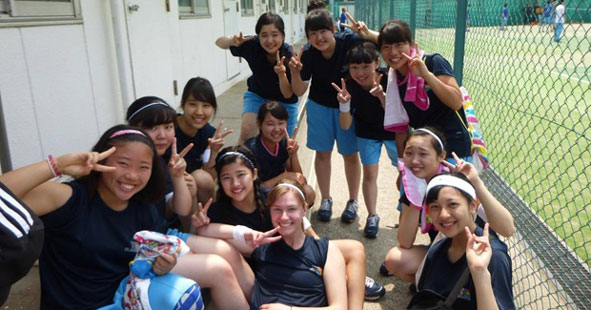
Semesters and breaks
The Japanese high school have three semesters. The school year start in April and ends in March.
The summer break lasts for approximately six weeks in July–August. You have a 2-3-week winter break in December–January, as well as a Spring break in March–April. The weeks off school are a wonderful opportunity to see more of Japan on trips and excursions if available.
Enquire now
Your spare time in Japan
You will have so much to discover and do on your exchange program in Japan. Depending on where in the country you are placed, you will experience different climates and a new way of life. Thanks to the country’s small size, and fantastic transportation, you will never be too far away from the metropolitan cities nor the coast.
Subcultures & Japanese traditions
Japan truly has something for everyone. If you are interested in anime, manga or Japanese popular culture, you are going to love it here. And even if you are not, you will appreciate checking out all of Japan’s unique subcultures during your high school exchange. The country has many characteristic subcultures, and it is fun, and interesting seeing how the teenagers express their style, in terms of fashion, music, and lifestyle.
Japan as a country offers a great mix of new technology and modern lifestyles, but also unique/exciting traditions that can only be found here. There are temples to visit, tea ceremonies to attend, and origami, ikebana or calligraphy classes to sign up for during your exchange program here. Visit museums and take the opportunity to learn more about Japan’s fascinating history and heritage as well.
Enquire now
Staying with a Japanese host family
When going to Japan on an exchange year, you will have know a caring Japanese host family. The family is happy to welcome you into their home and to show you the best the characteristics and fascinating country.
By living with a Japanese family, you will have insight into the different customs and traditions of Japan. You will notice differences regarding table manners, greetings, and social manners among other things.
Be curious, open-minded, and ask your host family questions about the lifestyle and values if you are not sure how to act. This will prepare you well for your everyday life in Japan. Did you know that they do not shake hands and that licking the tip of your chopsticks is considered as inappropriate behaviour here?
Host families all over Japan
Our host families live all over Japan, including attractive cities such as Tokyo, Kyoto, and Kobe. The families usually live in small houses or apartments. The typical Japanese family consists of two parents and one or two children but remember that all our host families look different. Some are married, others are single, some have children, others not. You may even find they have elderly grandparents living with them. What they all have in common is that they look forward to introducing you to their culture as well as to take part in yours.
Learn more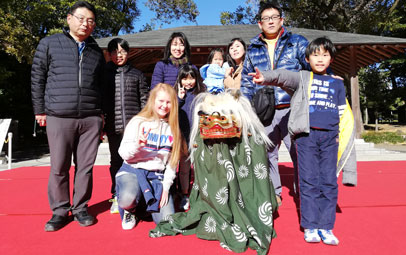
About high school in Japan
As an exchange student in Japan, you will explore the teenage life in an entirely different culture. Experiencing the daily life of your Japanese peers is invaluable. School uniforms, discipline, and the hiragana alphabet await in the Japanese high schools.
You can count on lots of attention and questions from curious classmates, particularly on those first days at school. Practice your Japanese skills in advance so that you can ask questions and answer your classmates smoothly.

Subjects and school activities
The classes in the Japanese high schools are often quite large, around 30-40 pupils per class. You will be placed in the class that suits your age and language ability best, and allocated a timetable. Local students usually take subjects such as mathematics, social studies, science, English, and Japanese, as well as one or two elective subjects. Elective subjects are generally very few.
Exchange students in Japan are expected to be active in class and put effort into all their subjects, especially Japanese language. You won’t be expected to know everything immediately, but it is important that you do your best and show interest.
Many Japanese high schools offer a range of sports and activities for you to engage in after school hours. Why not try judo or join an origami club? Participating in activities are a fantastic opportunity to find friends and become part of the community.

Semesters and breaks
The Japanese high school have three semesters. The school year start in April and ends in March.
The summer break lasts for approximately six weeks in July–August. You have a 2-3-week winter break in December–January, as well as a Spring break in March–April. The weeks off school are a wonderful opportunity to see more of Japan on trips and excursions if available.

Your spare time in Japan
You will have so much to discover and do on your exchange program in Japan. Depending on where in the country you are placed, you will experience different climates and a new way of life. Thanks to the country’s small size, and fantastic transportation, you will never be too far away from the metropolitan cities nor the coast.
Subcultures & Japanese traditions
Japan truly has something for everyone. If you are interested in anime, manga or Japanese popular culture, you are going to love it here. And even if you are not, you will appreciate checking out all of Japan’s unique subcultures during your high school exchange. The country has many characteristic subcultures, and it is fun, and interesting seeing how the teenagers express their style, in terms of fashion, music, and lifestyle.
Japan as a country offers a great mix of new technology and modern lifestyles, but also unique/exciting traditions that can only be found here. There are temples to visit, tea ceremonies to attend, and origami, ikebana or calligraphy classes to sign up for during your exchange program here. Visit museums and take the opportunity to learn more about Japan’s fascinating history and heritage as well.

Staying with a Japanese host family
When going to Japan on an exchange year, you will have know a caring Japanese host family. The family is happy to welcome you into their home and to show you the best the characteristics and fascinating country.
By living with a Japanese family, you will have insight into the different customs and traditions of Japan. You will notice differences regarding table manners, greetings, and social manners among other things.
Be curious, open-minded, and ask your host family questions about the lifestyle and values if you are not sure how to act. This will prepare you well for your everyday life in Japan. Did you know that they do not shake hands and that licking the tip of your chopsticks is considered as inappropriate behaviour here?
Host families all over Japan
Our host families live all over Japan, including attractive cities such as Tokyo, Kyoto, and Kobe. The families usually live in small houses or apartments. The typical Japanese family consists of two parents and one or two children but remember that all our host families look different. Some are married, others are single, some have children, others not. You may even find they have elderly grandparents living with them. What they all have in common is that they look forward to introducing you to their culture as well as to take part in yours.


Study at a high school in Japan
Take the opportunity to live and study in this amazing country. Learn Japanese and gain insight into the culture, language and lifestyle.
Read moreHear from our former exchange students in Japan
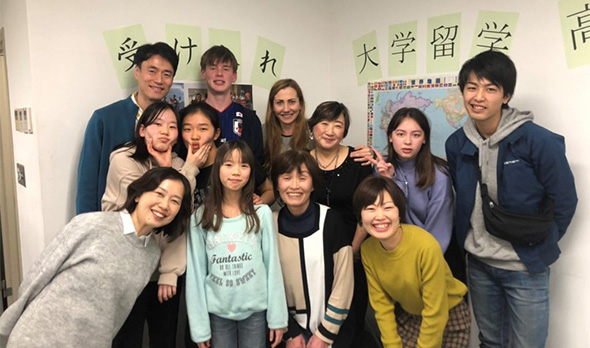
Lloyd IN Tokyo
Lloyd shares his tips and story “Improving your ATAR through student exchange”.
Read his blog story here.

Clayton
“My time in japan was such an amazing experience.
I learnt more language then I ever could have imagined and because I was placed in a such small Japanese town, everyone knew who I was, I felt so welcomed.”
Enquire now
The best way to prepare for your exchange program is to join an Information Session Webinar.
Please click here to register and then complete your details below and we will be in touch to answer your questions.
"*" indicates required fields


